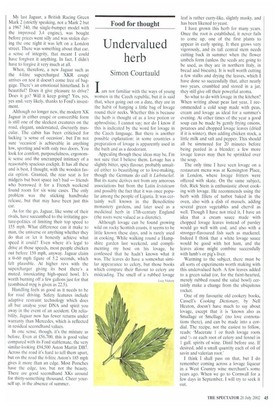Undervalued herb
Simon Courtauld
Iam not familiar with the ways of young women in the Czech republic, but it is said that, when going out on a date, they are in the habit of hanging a little bag of lovage round their necks. Whether this is because the herb is thought of as a love potion or aphrodisiac, I cannot say; nor do I know if this is indicated by the word for lovage in the Czech language. But there is another possible explanation: in some countries a preparation of lovage is apparently used in the bath and as a deodorant.
Appealing though these ideas may be, I'm not sure that I believe them. Lovage has a slightly bitter, spicy flavour, probably unsuited either to beautifying or to love-making, though the Germans do call it Liebstuckel. But its name derives not from any amorous associations but from the Latin levisticutn and possibly the fact that it was once popular among the people of Liguria. It was certainly well known in the Benedictine monastery gardens, and later used as a medicinal herb in 17th-century England (the roots were valued as a diuretic).
Although lovage can be found growing wild on rocky Scottish coasts, it seems to be little known these days, and is rarely used in cooking. While walking round a Hampshire garden last weekend, and complimenting my host on his lovage, he confessed that he hadn't known what it was. The leaves do have a somewhat similar appearance to celery, but those books which compare their flavour to celery are misleading. The smell of a rubbed lovage
Lucy Vickery
leaf is rather curry-like, slightly musky, and has been likened to yeast.
I have grown this herb for many years. Once the root is established, it never fails to come up, one of the first plants to appear in early spring. It then grows very vigorously, and its tall central stem needs cutting back in summer when the flower umbels form (unless the seeds are going to be used, as they are in northern Italy, in bread and biscuits). It is well worth cutting a few stalks and drying the leaves, which I have done so successfully that, after nearly two years, crumbled and stored in a jar, they still give off their powerful aroma.
So what to do with lovage in the kitchen? When writing about peas last year, I recommended a cold soup made with peas, cream and lovage as ideal for a summer's evening. At other times of the year a good soup can be made by gently frying onions, potatoes and chopped lovage leaves (dried if it is winter), then adding chicken stock, a little milk and salt and pepper. This should all be simmered for 20 minutes before being puréed in a blender: a few more lovage leaves may then be sprinkled over the soup.
The only time I have seen lovage on a restaurant menu was at Kensington Place, in London, where lovage fritters were offered with skate. On the same subject, fish, Rick Stein is enthusiastic about cooking with lovage. He recommends using the herb with fillets of turbot baked in the oven, also with a dish of mussels, adding several green vegetables and chervil as well. Though I have not tried it, I have an idea that a cream sauce made with chopped lovage leaves instead of parsley would go well with cod, and also with a stronger-flavoured fish such as mackerel. Indeed I think that a white lovage sauce would be good with hot ham, and the leaves alone might combine successfully with lamb's or pig's liver.
Warming to the subject, there must be all sorts of experiments worth making with this undervalued herb. A few leaves added to a green salad (or, for the faint-hearted, merely rubbed round the salad bowl) certainly make a change from the ubiquitous rocket.
One of my favourite old cookery books, Cassell's Cooking Dictionary, by Nell Heaton, doesn't have much to say about lovage, except that it is 'known also as Smallage or Smellage' (no love connotations there), and can be made into a cordial. The recipe, not the easiest to follow, reads: 'Macerate 1 oz fresh lovage roots and V4 oz each root of celery and fennel in I gall. spirits of wine. Distil before use. If desired, add a small quantity each of oil of savin and valerian root.'
I think I shall pass on that, but I do remember coming across a lovage liqueur in a West Country wine merchant's some years ago. When we go to Cornwall for a few days in September, I will try to seek it out.


























































 Previous page
Previous page